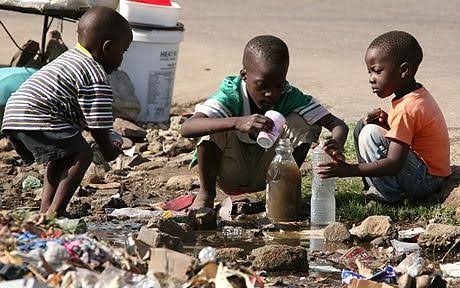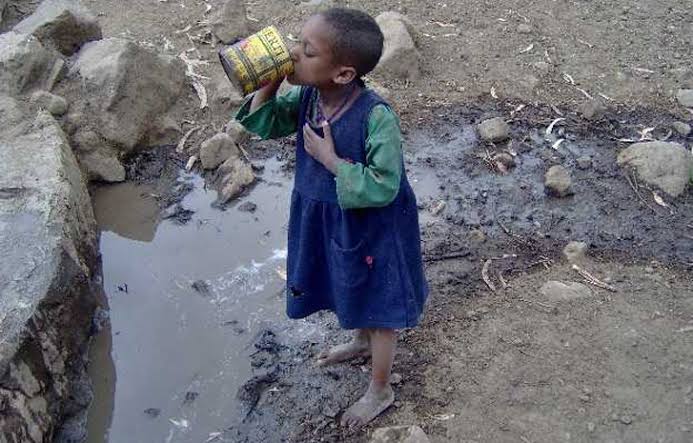NATIONAL WATER RESOURCES BILL AND THE NON-PROVISION OF PORTABLE CLEAN WATER

Only a Workers Govt. Can Provide Free & Adequate Water Supply to All Nigerian People
By Lateef Adams
It is so unfortunate that the debate over the controversial National Water Resources Bill reintroduce to the national assembly is not to provide portable clean water for the vast majority of the over 200 million Nigerians but majorly to control the land around water banks. The bill was first introduced to the eighth assembly by the Buhari regime as an Executive Bill in 2017 but was rejected by the lawmaker. The bill was reintroduced into the ninth National Assembly in July 2020 by Hon. Sada Soli, the Chairman of the house committee on Water Resources, eventually didnt scale through.
The continuous reintroduction of the bill has stirred several outcries and condemnation from different sections of the people accusing the federal government (FG) of trying to take control of land along states and divert their usage to forcefully implement the controversial rural grazing policy. The bill if passed is said to bring all water sources and river banks under the control of the FG and cede land and waterways across the country about 2 kilometres inland to the FG.
Ordinarily this should be welcomed by socialists, but the reality is that the bill is far from such intention of putting the water needs of the people first and foremost, rather the bill seeks to commercialise the country water resources as a first step towards it full scale privatization. It is very quest that drives the Buhari regime to want to be preside over this commercialisation process by being the sole owner and singular issuer of license for the commercial supply and use of water.
We in the Movement for A Socialist Alternative (MSA) condemn this provision that will take water out of the reach of the ordinary working-class people. What it means is that the Buhari regime is planning to put away the responsibility of the government in providing potable drinking water to the citizens and shift the supply of water to private profiteers. The same way the Jonathan government privatize the power sector to their cronies milking Nigerians under the guise of tariff increment without improvement in the power supply.
Sustainable and equitable access to safe drinking water remains a challenge in Nigeria. According to the United Nations Childrens Fund (UNICEF) report on Nigeria in 2021, it states that over 86 per cent of Nigerians lack access to safely managed drinking water sources. The problem is compounded by poor drinking water quality and lack of equity in access although 70 per cent of Nigerians are reported to have access to basic water services, more than half of these water sources are contaminated.

The report doubted the country’ss commitment to meet the Sustainable Development Goal (SDG) number 6 which is the provision of clean water and sanitation. That the country will miss the SDG target on people’s access to water unless there is a strong commitment and appropriate action taken by the government.
With the current controversial bill, it is clear that the government is not interested to invest in the provision of clean water for its citizens. A look at the budget breakdown of the Ministry of Water Resources attests to the unserious commitment of the political actors. The Nigerian Tribune research showed that the water ministry expends N258.5 million on budget preparation in four years. Other expenses on the budget breakdown given priorities over the years include provision for utility movement for the budget which is the purchase of vehicles and implementation of programmes among others.
The criticism and condemnation of the Water Resources Bill by most state government officials are not on the bases of the inability for it to provide portable clean water for the populace but because the bill allows the FG to take control of land in their states. Most state governments are also guilty of the inadequate provision of clean water in their states. State water ministries only exist on paper with huge budgetary allocations going into the ministries without accounting for it.
The Nigerian masses are on the receiving end, the majority of people depend on water from boreholes for drinking and other domestic use. In most cities, a 20-litre bucket of borehole water costs around N100, and with the constant interruption of power supply in the country, the mass of the ordinary working-class people are in a state of quagmire. The resident will have to pay more for water since the water pumping machine will be carried out by the use of a diesel generator. With diesel now sold for as high as N800 per litre, water is now a commodity getting out of the reach of the working-class family.
President Buhari’s capitalist government have shown that it cannot provide affordable clean water for the Nigerian populace. The state government have not demonstrated a difference from the corrupt capitalist system they adopt. Only public ownership of the means of production of the economy under democratic management and control by the working people and community can guarantee a free water supply to its citizens.
A working-class government that will nationalize the commanding sector of the economy with a Socialist program is the minimum required with a public investment needed for decades of chronic underinvestment. With a socialist plan of production, a workers’ government could restore the SDG target after decades of capitalist abuse of the system.
